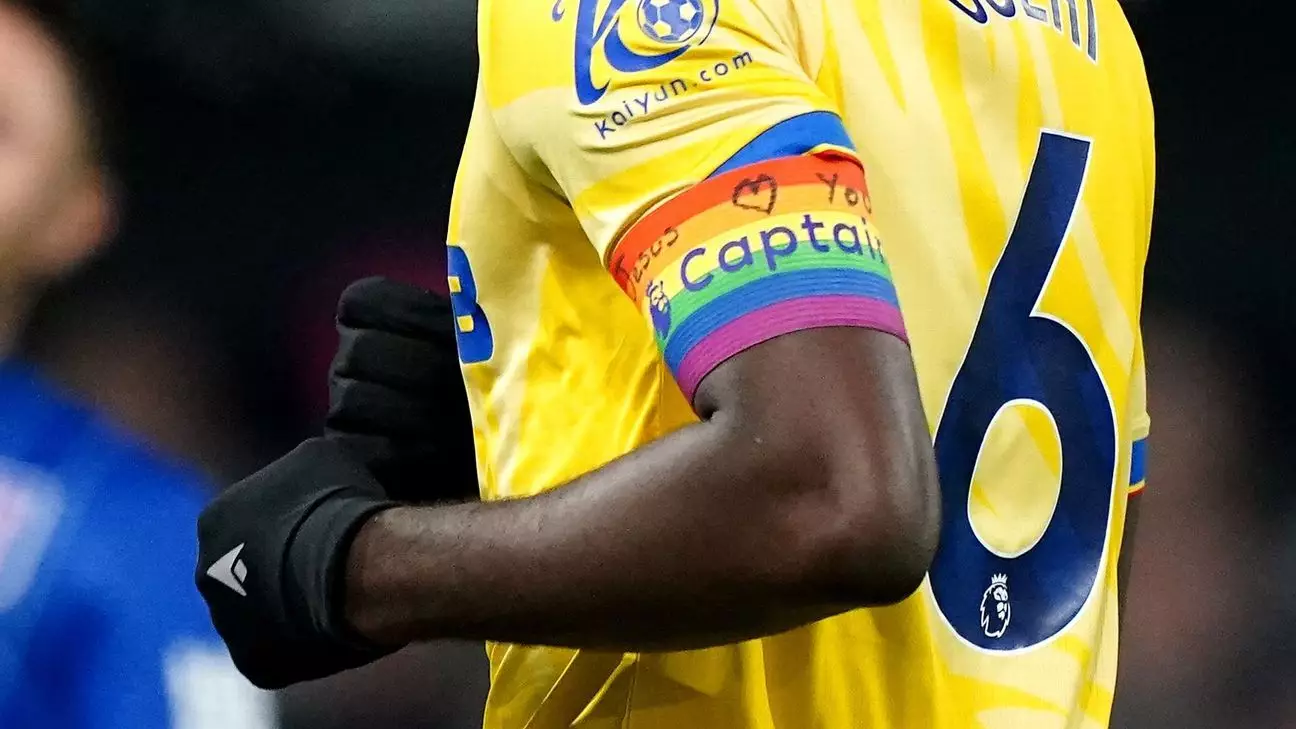The intersection of faith, identity, and regulations in sports, particularly football, has been a point of contention and discussion lately. An illustrative case emerged recently involving Crystal Palace defender Marc Guéhi, who inscribed religious messages on his captain’s armband during matches, igniting debates about adherence to rules and respect for inclusivity. This situation underscores not only the individual beliefs of players but also the wider implications for teams and their commitment to progressive values.
In a recent match against Ipswich Town, Marc Guéhi donned a rainbow-colored captain’s armband—a symbol of support for the LGBTQ+ community—yet chose to write messages reflecting his Christian beliefs, such as “Jesus loves you” and “I love Jesus.” The Football Association (FA) raised concerns about these inscriptions, as they potentially contravene Rule A4 of the FA’s kit regulations, which prohibits religious messages or slogans on uniforms. This warning came on the heels of a lighter reprimand following his similar gestures in a prior match against Newcastle United.
Having witnessed Guéhi’s actions, Crystal Palace manager Oliver Glasner downplayed the significance of the controversy, framing it as a personal expression of opinion rather than a blatant defiance of the rules. He contended that while Guéhi is entitled to his beliefs, these expressions must navigate the broader context of inclusivity within the sport. This approach reflects a delicate balancing act between personal faith and collective values in a team environment.
The FA’s regulations regarding armbands and uniform slogans are rooted in a desire to maintain a level playing field and focus on the sport itself, away from distractions caused by personal convictions. The update to the Laws of the Game last summer aimed to clarify that captains must wear armbands that conform to requirements, specifically avoiding messages that could promote specific ideologies or beliefs. This legislative backdrop raises questions about how inclusivity and personal expressions of faith can coexist in professional sports.
The rainbow armband, introduced by the Stonewall organization, signifies a commitment to LGBTQ+ inclusivity, and its distribution across Premier League clubs illustrates a unified stance against discrimination. Clubs and players are expected to uphold these values, creating an environment that embraces diversity on and off the field. Guéhi’s actions, however, present a challenge to this narrative, as they poignantly cross wires between open support of LGBTQ+ rights and personal religious expression.
The Perspectives of Other Players
The response to Guéhi’s armband messages sheds light on the varied beliefs present within football. Ipswich midfielder Sam Morsy, who identifies as a practicing Muslim, notably refused to wear the rainbow armband during the matches, preferring the traditional black version. His decision, characterized as a personal matter by the FA, highlights the complexities players face when navigating their identities in a sport that increasingly prioritizes inclusivity.
Morsy’s situation illustrates the need for greater dialogue about inclusivity and respect for diverse beliefs within football. While some players openly support initiatives aimed at fostering an accepting atmosphere, others wrestle with their own religious convictions that could contradict these messages. This dichotomy begs for an open dialogue between players, clubs, and governing bodies.
The case of Marc Guéhi and his religious messages on a rainbow armband encapsulates the ongoing challenges football faces in reconciling personal beliefs and collective values. As the sport continues to evolve towards greater inclusivity, it must also find ways to accommodate individual expressions of faith without undermining the overarching goals of unity and acceptance for underrepresented communities.
To foster a truly inclusive environment, there must be ongoing conversations among players, clubs, and governing bodies, ensuring that emotional and faith-based expressions are acknowledged in a manner that respects both individual identity and the movement toward a united sport. By embracing these discussions, football can evolve into a realm that celebrates diversity—be it sexual orientation, religious belief, or personal ideology—creating a culture where every player, regardless of their background, feels valued and respected.

Leave a Reply